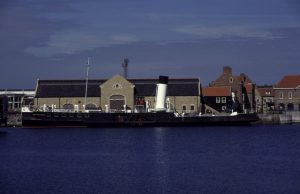
The Museum of Hartlepool with PS Wingfield Castle in the foreground
As part of the on-the-job training for staff seconded from Japan, a visit was organised to Hartlepool to see the regeneration of the main street, Church Street, and the art galleries along the road, as well as the waterfront area.
The first stop was Main Street, located right in front of the railway station and was very accessible by rail. However, several vacant shops were observed along the road, although there were many buildings with shops on the ground floor and residences on the second floor. The local authority is currently grappling with issues around regeneration, an issue that is also commonly seen in Japan’s high streets.
In the Hartlepool Museum, there were photographs of the town from various periods in Hartlepool’s history, a display on the development of fishing boats and an exhibition where visitors could compare the sounds of sea birds as exhibits unique to a port town. The most eye-catching display was the history of the town’s bombardment during the First World War. Hartlepool was targeted by the Germans because of its growing shipbuilding industry and was attacked on 16 December 1914, reportedly resulting in at least 130 dead and 500 wounded.
Hartlepool Borough Council
Hartlepool has been selected for the Towns Fund and has received a £25 million grant from the government to carry out a major redevelopment. The Towns Fund is a grant for 100 small and medium-sized local authorities across the country as part of the UK Government’s ‘Levelling Up’ policy, which aims to promote sustainable local economic regeneration to deliver long-term economic growth and productivity gains.
Hartlepool has identified issues affecting the town centre to be a lack of investment in employment and skills development, abandoned historic buildings and access from the station to the town centre and marina area, and is using the grant to address the situation.
During this visit, the council leader and town officials explained ongoing initiatives and led a tour of the town. During the lecture, they explained particularly important projects, such as the construction of technical training facilities, the redevelopment of the shopping centre, the renovation of historical buildings and the redevelopment of the railway station.
In cooperation with educational institutions and the private sector, training facilities are being developed to enable young people to engage in technical development in the health and social care sector and civil engineering. In addition, in the redevelopment of the Middleton Grange shopping centre in the town centre, the station is attempting to reuse the building as a mixed-use facility with additional uses as a public space.
In the redevelopment of Wesley Chapel, a historic building constructed in 1873, a project is underway to convert the chapel, which has been left in disrepair since a major fire in 2017, into a boutique hotel.
In the redevelopment of Hartlepool station, as much as £12 million will be spent to add more tracks, platforms and turnstiles. The expansion of the tracks is intended to increase the number of trains travelling north-south and increase the number of visitors. Currently, the station only has turnstiles on the south side of the station, which means that access to the marina area to the north requires a diversion and crossing of the tracks, but by adding new turnstiles on the marina area side, the aim is to improve access.
In addition, efforts are being made to attract creative industries to the area, and it is hoped that the new film and video production school on the main street and the Northern Studios film studio will help to create a buzz.
One of the local government officers spoke about the importance of using public investment to create the right conditions and ensure a certain level of market credibility to accommodate private investment, and that public intervention is the foundation for the future.
After the talks, staff strolled from the main street to the entrance of the marina area, where they were briefed on the issues of accessibility. In addition to issues of accessibility from the station, the participants were told that the marina area also has some conducive route challenges. The lack of a promenade makes it difficult to access the area where the restaurants are concentrated, and the lack of a map of the area makes it difficult to know where they are and the route to the restaurant area.
Through the UK Government’s Levelling Up Policy, redevelopment is being promoted by local authorities in the UK, and major changes are expected in many areas.
Many thanks to colleagues at Hartlepool Borough Council for the warm welcome and valuable learning opportunity.

